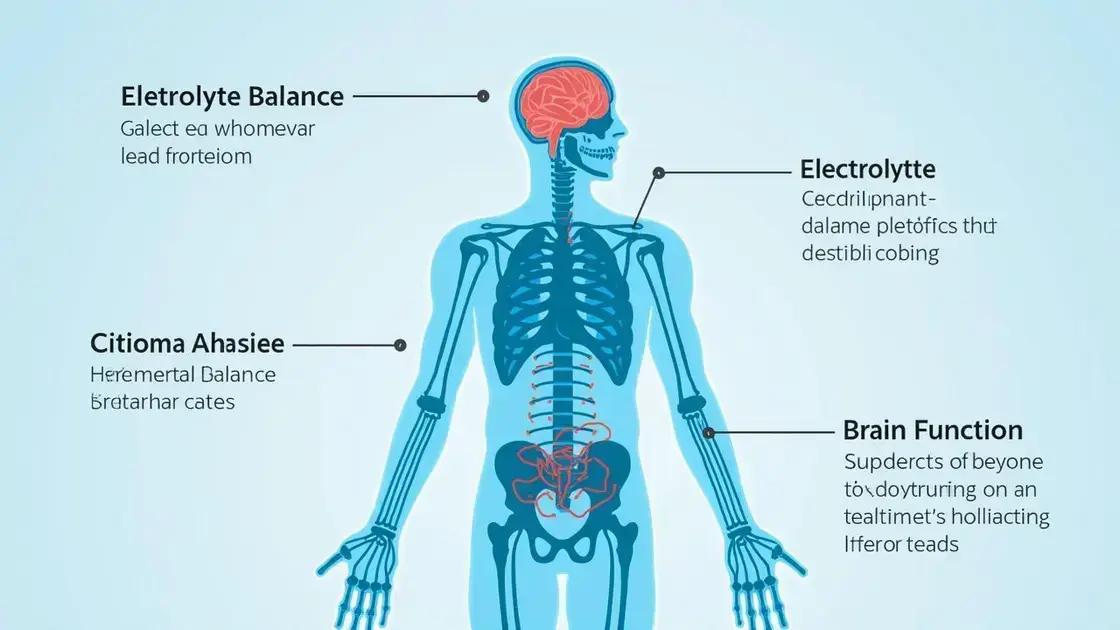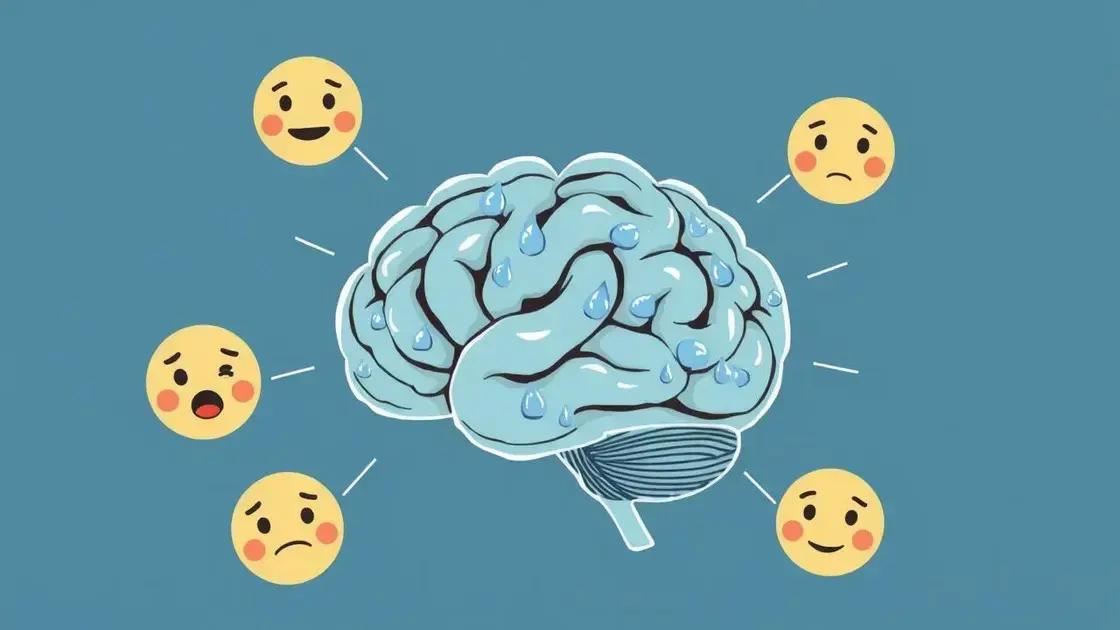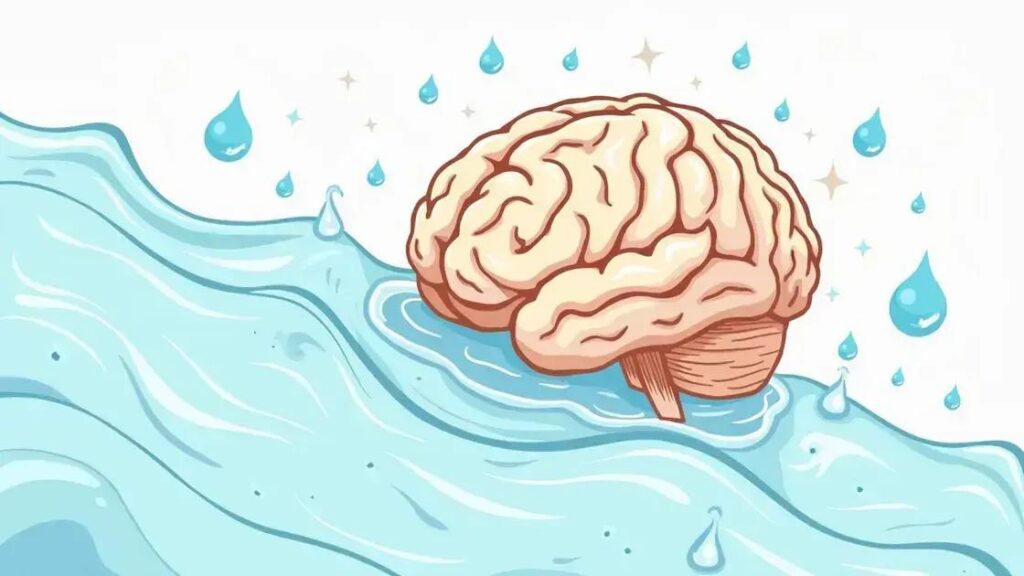The link between mental clarity and hydration is vital, as adequate water intake boosts cognitive function, improves mood, and prevents mental fatigue, while dehydration can lead to irritability and concentration issues.
The link between mental clarity and hydration is essential for maintaining focus and cognitive function. Staying hydrated not only improves physical health but also enhances mental performance. In this article, we will explore the intricate relationship between hydration and mental clarity, delve into the science behind how water affects our brains, and provide practical tips for ensuring you stay hydrated throughout your day.
Understanding Mental Clarity

Mental clarity refers to the ability to think clearly, focus on tasks, and process information effectively. When your mind is clear, you can make better decisions and stay productive throughout the day. It involves having a sharp focus and being able to concentrate on the present moment without distractions.
Several factors affect mental clarity. Stress, lack of sleep, poor diet, and dehydration can all cloud our thinking. Staying hydrated is vital for maintaining optimal brain function. Water is an essential element that aids in various processes in our bodies, including cognitive functions.
Factors Influencing Mental Clarity
In addition to hydration, other factors such as nutrition play a significant role. Foods rich in antioxidants, vitamins, and minerals support brain health. Foods like berries, fish, nuts, and leafy greens are excellent for enhancing clarity. Meanwhile, consuming lots of sugary and processed foods can lead to brain fog, reducing your ability to think clearly.
It is important to realize that mental clarity is not just about having a sharp focus but also being in tune with your emotions and thoughts. Practices such as mindfulness and meditation can assist in achieving mental clarity. These activities help clear away distractions and increase awareness of one’s thoughts, leading to improved concentration.
The Role of Hydration
Hydration directly impacts cognitive performance. Studies suggest that even mild dehydration can impair focus, memory, and overall mental function. Therefore, drinking enough water throughout the day is crucial for maintaining mental clarity. Carrying a water bottle and regular hydration breaks can help keep your mind sharp.
The Science of Hydration

Water is essential for human life, making up about 60% of our body weight. The science of hydration shows that water is crucial for various bodily functions. It helps in digestion, nutrient absorption, and temperature regulation. Without adequate hydration, our bodies cannot perform at their best.
When you drink water, it enters your bloodstream and is distributed to cells and organs. This process helps maintain blood volume and circulation. Additionally, hydration supports brain function. Studies have indicated that even mild dehydration can lead to decreased attention, memory issues, and increased fatigue.
The Importance of Electrolytes
Along with water, the body also needs electrolytes like sodium, potassium, and magnesium to function properly. These minerals help balance fluids in the body and are vital for nerve signaling and muscle contractions. Maintaining a proper balance of both water and electrolytes contributes to optimal cognitive function and mental clarity.
Hydration also plays an essential role in removing toxins from the body. The kidneys rely on adequate water intake to filter waste and ensure that our body remains balanced and healthy. Therefore, staying properly hydrated aids in enhancing not only physical health but also mental performance.
How Much Water Do We Need?
The recommended daily water intake varies but generally suggests about 8-10 cups a day for most adults. This amount can change based on individual factors like age, weight, and physical activity level. Remember that hydration also comes from food, especially fruits and vegetables.
Effects of Dehydration on Mental Health

Dehydration can have serious effects on mental health. When the body lacks enough water, it can impact brain function and emotional well-being. Studies show that even mild dehydration can lead to mood swings, irritability, and increased feelings of stress.
When you’re dehydrated, your brain may struggle with cognitive tasks. You might experience difficulties with concentration, memory, and overall mental performance. This can lead to decreased work productivity and hinder daily activities.
Connection to Anxiety and Depression
Research suggests a connection between dehydration and symptoms of anxiety and depression. Dehydrated individuals may feel anxious or exhibit mood changes. In addition, chronic dehydration can contribute to long-term mental health issues.
Water plays a key role in producing neurotransmitters, which are chemicals that help transmit signals in the brain. Insufficient water intake can affect these neurotransmitters, leading to emotional imbalances and difficulties regulating mood.
Signs of Dehydration
It is important to recognize the signs of dehydration. Symptoms can include dry mouth, fatigue, and headaches. If you notice these symptoms alongside feelings of mental fatigue or irritability, it could be a sign that you need to hydrate.
Tips for Staying Hydrated

Staying hydrated is vital for mental clarity and overall health. Here are some tips for staying hydrated throughout your day:
1. Carry a Water Bottle
Always keep a reusable water bottle with you. Having it on hand makes it easier to drink water throughout the day. Choose a bottle that you enjoy using, as that can encourage you to drink more.
2. Set Reminders
Using your phone to set reminders can help you remember to drink water. Try setting a timer for every hour to take a few sips. This can help create a hydration habit.
3. Eat Water-Rich Foods
Incorporate fruits and vegetables with high water content into your diet. Foods like watermelon, cucumber, oranges, and strawberries not only hydrate but also provide essential nutrients.
4. Flavor Your Water
If plain water doesn’t excite you, try adding flavor! Slices of lemon, lime, cucumber, or mint can make drinking water more enjoyable and refreshing.
5. Monitor Your Intake
Keep track of how much water you’re drinking daily. Apps and journals can help you stay accountable and ensure you’re meeting your hydration goals.
The Importance of Hydration for Mental Clarity
In conclusion, the link between mental clarity and hydration is undeniable. Staying properly hydrated enhances cognitive function, improves mood, and prevents mental fatigue.
By understanding the science of hydration, recognizing the effects of dehydration on mental health, and implementing practical tips for staying hydrated, you can significantly boost your mental performance.
Remember to carry a water bottle, monitor your intake, and enjoy water-rich foods to keep your mind sharp. Prioritizing hydration is essential for achieving optimal mental clarity and overall well-being.
FAQ – Frequently Asked Questions about the Link Between Mental Clarity and Hydration
How does hydration affect mental clarity?
Hydration is critical for maintaining cognitive function. Adequate water intake helps improve focus, memory, and overall brain performance.
What are the signs of dehydration related to mental health?
Signs of dehydration can include fatigue, irritability, and difficulty concentrating. These symptoms can negatively impact mental health.
How much water should I drink daily?
A general guideline is to drink about 8-10 cups of water daily, but individual needs may vary based on factors like activity level and climate.
What are some effective tips for staying hydrated?
Carry a water bottle, set reminders to drink water, eat water-rich foods, and track your daily intake to stay hydrated.
Can dehydration lead to long-term mental health issues?
Chronic dehydration can contribute to symptoms of anxiety and depression, making it essential to maintain proper hydration for mental well-being.
What foods can help with hydration?
Foods like watermelon, cucumbers, oranges, and strawberries are high in water content and can contribute to your overall hydration.













